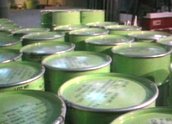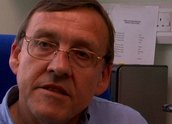


A Hard Rain (2007)
Synopsis
A Hard Rain explores the global nuclear industry, covering the nuclear fuel cycle from beginning to end, radioactive waste and weapons manufacture. It questions the agendas behind the pro-nuclear push in Australia and debunks the myths that nuclear power is safe, green and cheap. A Hard Rain looks at uranium mines in Australia, power plants in Japan, a reprocessing station in the UK and making weapons in China. It is a personal film, narrated by the filmmaker who grapples with the science of the nuclear debate and the many issues, disasters and problems that surround it. A Hard Rain features interviews with prominent scientists, politicians and bureaucrats, news footage and out-takes from Bradbury’s previous films on the nuclear issue – Blowin’ in the Wind (2005), Jabiluka (1997) and Public Enemy Number One (1981).
Curator’s notes
On his website, David Bradbury says he was inspired to make A Hard Rain after John Howard came back from visiting George W Bush a sudden convert to all things nuclear. Bradbury was also appalled that the Australian Labor Party was considering overturning their 25-year-old policy of no new uranium mines. If this happened (which it did), both major political parties would then be committed to mining and shipping more uranium offshore. He felt an urgency, but also a growing sense of powerlessness, as the federal elections approached. A Hard Rain came out of his concern that Australia was about to embark on the biggest environmental disaster since white settlement.
Bradbury has made four documentaries on the nuclear issue over the past 26 years. He doesn’t pretend to be objective on the subject, and states that up-front in A Hard Rain. What left him reeling while making this particular film were the revelations from overseas scientists who challenged current beliefs on 'safe’ levels of radiation – levels we can be exposed to before cancers and birth defects are potentially triggered. The documentary clearly questions whether the risks to our health and environment from contamination, radioactive waste and toxicity lasting thousands of years is worth the profit acquired by the nuclear industry. A Hard Rain is informative, alarming and thought provoking.
It was financed through Frontline Film Foundation, which Bradbury set up a number of years ago 'to fund and promote the production of films of cultural, environmental and political importance to Australia’. The Foundation so far has assisted three feature documentaries and several short films, including Bradbury’s Jabiluka (1997) and Blowin’ in the Wind (2005), as well as films by other filmmakers.
Bradbury calls himself a 'social political documentary filmmaker’. He is a passionate activist and often controversial, making films on very low budgets and a lot of goodwill. On A Hard Rain, he was offered frequent flyer points from a mysterious 'Auntie Michele’ to get to Japan and China to film. He was able to get a free 15-day rail pass in Japan and, after his video camera was submerged in water while filming in a sensitive area in Japan, a local filmmaker let Bradbury borrow his camera for four days in Okinawa.
Many community groups have screened the film in cities and towns across Australia. Bradbury and a small team even took it to Roxby Downs (home of BHP-Billiton which features in the film). They had two screenings there with question and answer sessions and gave out free copies of the film. Some of the miners attended and even company representatives turned up. Bradbury has extracted the story about Roxby Downs and cut a seven-minute clip called All that Glitters is not Gold which has been distributed widely and is available on YouTube as well as his website.
A Hard Rain won Best International Feature at the Reel Earth: The Aotearoa Environmental Film Festival in New Zealand in 2007. David Bradbury has made over 18 documentaries and is a multi-award winner, including five AFI awards. He has received two Academy Award nominations, for Frontline (1980), which profiled war cameraman Neil Davis, and Chile: Hasta Cuando (1986), about the brutal military dictatorship of General Pinochet.
- Overview
- Curator’s notes
- Video 3 clips

- Principal credits
- Find a copy
- Make a comment
- Add your review



